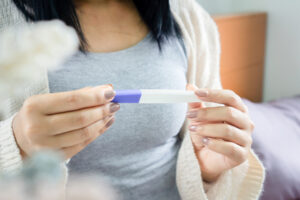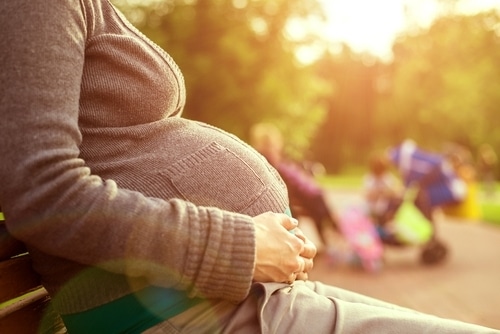By Wesley Gallagher
Many women with anorexia and bulimia deny that they have an eating disorder. The desire to become pregnant or the pregnancy itself does not alter this secrecy. For example, women with bulimia sometimes claim that their vomiting is due to morning sickness rather than their eating disorder. Therefore, medical professionals must take great care with patients who may have eating disorders.
Anorexia and Pregnancy
Many people know about the impact of anorexia on fertility, as changes to menstruation are a common marker of eating disorders. Malnourishment and low body weight can lessen or even stop ovulation, and vitamins and minerals essential for conception are depleted.
Many women still get pregnant, however, and managing eating disorders during pregnancy is important because there is a connection between anorexia and pregnancy complications. The body goes through many changes during pregnancy, and this can heighten the body image issues that characterize eating disorders. But nutrition is vitally important for both mother and baby, and doctors will monitor weight to ensure that enough is being gained to support the growing fetus.
Bulimia and Pregnancy
The impact of bulimia on fertility is the same as anorexia, as both disorders ultimately lead to reduced caloric intake and low body weight. The connection between bulimia and pregnancy complications is slightly different, however, due to the act of purging.
For instance, stomach acids from vomiting cause dental issues like tooth decay, enamel erosion, and gum irritation. According to the Journal of the Turkish Germany Gynecological Association, pregnancy can exacerbate oral health issues and lead to complications such as premature delivery, low birth weight, gingivitis, and preeclampsia, among others. Purging also causes dehydration and electrolyte imbalances, both of which are dangerous for the fetus.
Risks to the Mother
Eating disorders during pregnancy also pose a variety of physical and emotional difficulties for the woman herself. Physical complications include more vaginal bleeding during pregnancy, a higher likelihood of cesarean deliveries, and greater difficulty healing in the episiotomy area. With anorexia, you will most likely experience little weight gain. With bulimia, you will often gain a great deal of weight, placing you at risk for severe hypertension.
A pregnant woman’s expanding and changing body often causes profound anguish and emotional conflict. Some women manage to maintain health throughout the pregnancy for the sake of their unborn child, and then make a radical return to their eating disorder immediately after delivery. Others cannot maintain health during pregnancy and must be hospitalized.
Women with binge eating disorder may be at particular risk of developing gestational diabetes and preeclampsia, both of which are dangerous. A study in the International Journal of Eating Disorders found that binge eating was associated with gestational diabetes due to the connection between bingeing and weight gain. Being overweight also increases the risk of gestational hypertension and preeclampsia. Any woman with an eating disorder who becomes pregnant will be considered high risk because of the strong connection between poor maternal health and eating disorders.
Following the birth of the child, women with eating disorders also have a higher incidence of postpartum depression than other women. They also have more problems breastfeeding, including insufficient lactation or negative reactions to breast milk in their babies. Inadequate breast milk is often the result of dehydration. For these reasons, women with eating disorders are more likely to discontinue breastfeeding prematurely.
Risks to the Baby
Pregnant women who continue to practice their eating disorder have a higher incidence of first-trimester miscarriage, stillbirths, low infant birth weights, breech babies, and congenital malformation. Additionally, their infants’ APGAR scores — which measure infant health immediately following birth — are generally lower than the scores of babies born to healthy women.
It’s important to pay attention to nutrition during pregnancy with an eating disorder. Nutritional deficiencies and the strain that disordered eating puts on the body can hinder fetal growth. Research conducted by Obstetrics and Gynecology revealed that women with present as well as past eating disorders had babies with significantly lower birth weight. Additionally, a JAMA Psychiatry study found increased risk of preterm birth associated with all eating disorders.
Premature and low birth weight babies are at greater risk for long-term health issues. Premature infants are more likely to suffer from asthma, feeding problems, and other illnesses, as well as sudden infant death syndrome. Low birth weight is associated with higher rates of subnormal growth, illnesses, and neurodevelopmental problems. Research also suggests that mothers with eating disorders may be more controlling of their infants than mothers without eating disorders.
What Should I Do If I Have an Eating Disorder and Become Pregnant?

The good news is that if you have an eating disorder and manage to gain a normal amount of weight throughout your pregnancy, you will not experience a higher risk of complications or birth defects. Sometimes, by focusing on the health of your developing baby and your wish to be the best mother, you can make a commitment to recover from your eating disorder.
If you are pregnant and currently struggling with an eating disorder, or have struggled with an eating disorder in the past, it’s important that you tell your ob-gyn or prenatal healthcare provider. You may need to be seen by your doctor more often so that he or she can more closely track the growth and development of your baby. You may also want to consult with a dietician or therapist who specializes in treating eating disorders to develop a plan for healthy eating and appropriate weight gain.
Concerned? Contact Us Today
If you are pregnant and struggling with an eating disorder, don’t hesitate to get the support you need to enjoy a healthy pregnancy and birth. It is important to be honest with your healthcare providers so they can give you proper medical care.
All in all, make sure that you put together a good support team consisting of doctors, therapists, family, and friends who can offer you the care and support both you and your baby need to stay happy and healthy.
If you have questions about eating disorder treatment during pregnancy, please contact us and learn more about how The Meadows Ranch can help both you and your one on the way.

